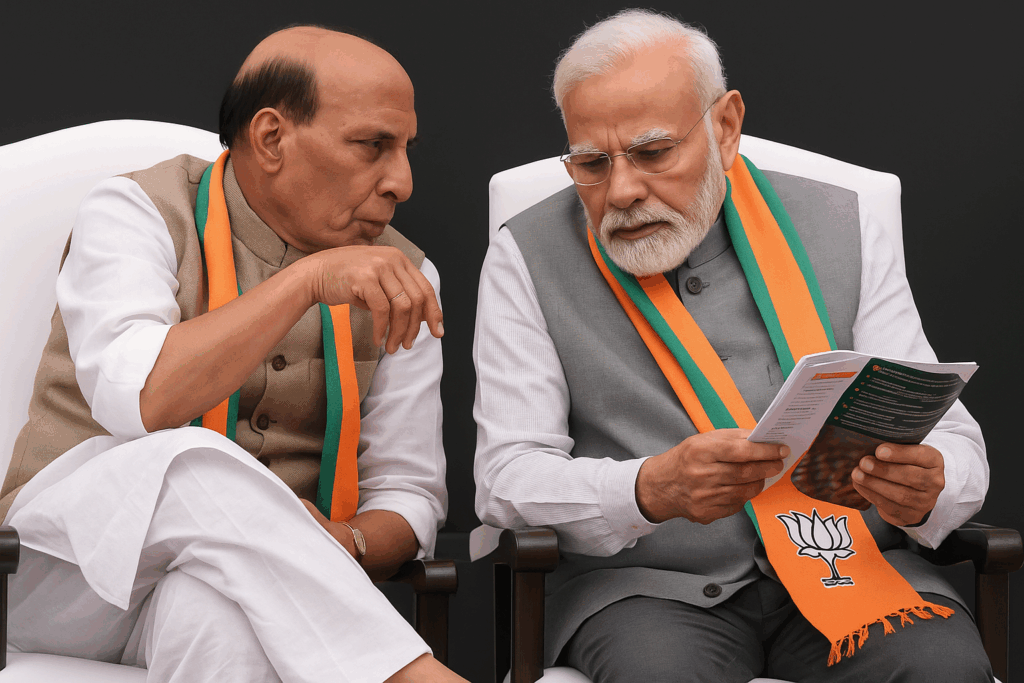Tensions Escalate: Defence Minister Briefs PM Modi Amid High-Level Military Alerts After Pahalgam Attack
As India grapples with the shock of the Pahalgam terror attack, high-stakes meetings behind closed doors hint that a decisive response is in motion.
Early Morning Consultations: Defence Minister Meets Army Chief
In a critical development on Monday morning, Defence Minister Rajnath Singh arrived at South Block for an urgent meeting with the Army Chief. The discussions reportedly centered around the ongoing counter-terror operations in Pahalgam, where a massive search and combing exercise is underway following the brutal terrorist strike.
The Defence Minister was given detailed updates about the military’s ground strategies, aerial surveillance measures involving helicopters and drones, and the intelligence inputs received so far.
High-Level Strategy: Singh Updates Prime Minister Modi
Soon after his meeting with military officials, Rajnath Singh headed straight to Lok Kalyan Marg to brief Prime Minister Narendra Modi. The two leaders held a high-intensity, 40-minute meeting where Singh provided a confidential overview of the situation on the ground and future operational plans.
Sources indicate that the discussions were marked by urgency and seriousness, underlining the possibility of a major retaliatory move against terror networks operating from across the border.
Signs of a Major Move: Is India Preparing for a Bold Response?
Ever since the deadly Pahalgam attack, the Indian government’s tone has hardened considerably. PM Modi’s public statements and the flurry of top-level meetings suggest that India may be gearing up for a significant military or strategic response.
From Delhi’s corridors of power to the borders, a high alert has been sounded. Troop movements, intelligence coordination, and diplomatic outreach indicate that the Indian state machinery is fully mobilized, and “something big” might be imminent.
Modi’s Strong Words: “Terror Will Be Avenged”
In his latest ‘Mann Ki Baat’ address, Prime Minister Modi had sent out a stern message:
“The Pahalgam terror attack has pained every Indian deeply. Our solidarity with the bereaved families is unwavering. Every Indian’s blood boils seeing the images of this cowardly act. When Kashmir was moving toward peace, growth, and prosperity, the enemies of India couldn’t bear it. But we will not allow them to succeed. Justice will be done — the perpetrators and their handlers will face the most severe consequences.”
This powerful statement underscores the national mood and the government’s likely roadmap: a no-compromise, swift counter to terror elements.
Situation on the Ground: Pahalgam Under Operation Clean-Up
Since the April 22nd attack that killed 26 tourists and injured 16 others, security forces have launched an extensive manhunt in the Anantnag district’s dense forests. Drones, helicopters, and special commando units are scouring the rugged terrain. Several terror suspects have reportedly been intercepted, but the operation remains ongoing.
Officials have hinted that certain critical intelligence has been gathered, and major announcements could follow soon. Meanwhile, security has been ramped up across Jammu & Kashmir, and civilian vigilance has been intensified.


